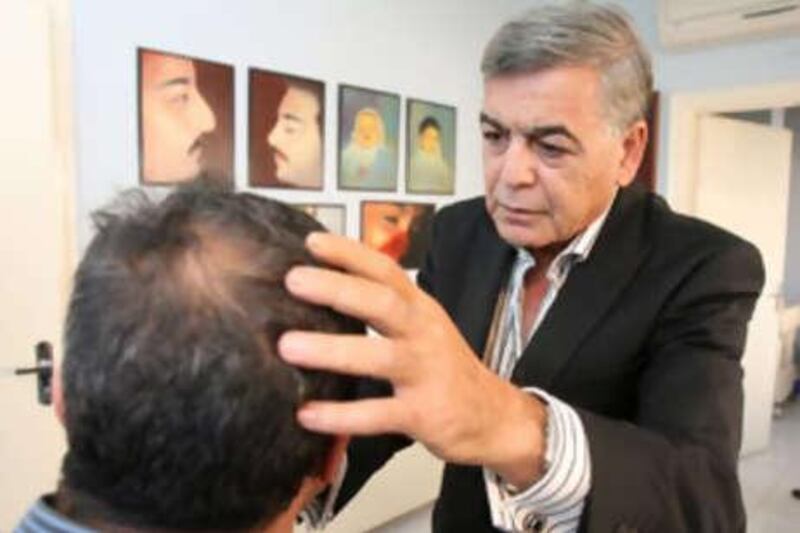AMMAN // Mazen, a 48-year-old businessman, sees nothing wrong with men turning to Botox to smooth out the wrinkles of age. "I had it done six months ago, and I felt better about myself," he said, although he did not want to reveal his real name. "I even had a hair transplant 12 years ago when my hairline started receding ? I know four men who had nose jobs." In a conservative society such as Jordan, men are expected to be tough and uncompromising, but plastic surgeons say they are seeing more men knocking at their doors looking for a nip and tuck. Although their numbers are still far short of the number of women undergoing cosmetic surgery, they have more than doubled in the past five years. Men now make up about 10 per cent to 25 per cent of cosmetic surgeons' clientele, with most claiming they are doing it for professional reasons. "We are noticing a trend among businessmen seeking cosmetic surgery. Appearances are part of the personality, and improving the looks is no longer a luxury," said Mohammad Baddawi, a consultant plastic reconstructive surgeon and president of the Jordanian Society of Plastic Surgeons. Most men seek Botox injections, nose jobs and liposuction, while breast augmentation tops women's priorities, followed by nose jobs, liposuction and tummy tucks. Competition for jobs continues to increase in Jordan amid high unemployment that officially stands at 14.3 per cent of the country's 5.8 million people. "Bankers, engineers, doctors and businessmen come to me ? and once, a patient who owned a women's clothing boutique asked me to fix the lines on his forehead. He said women thought he was frowning," Dr Baddawi said. Abdul Salam Abulfailat, a consultant plastic surgeon and the former president of the Arab League for Plastic Surgery, said a quarter of his patients were men, mostly in their 30s. Just a decade ago, men totalled less than eight per cent, he said. "For those working in PR, the nature of their job requires that they interact with the public and therefore, appearances complement the personality, apart from the qualifications," he said. "Appearances have become like a ticket for many professionals. "I do not rule out that in a few years time that the ratio of men to women undergoing plastic surgery will be 50:50," he said. There are about 40 plastic surgeons operating in the country, half working in the private sector offering an array of services from Botox injections and breast surgeries, to fixing droopy eye lids, saggy eye bags and face lifts. There are no definitive statistics on how many Jordanians have opted for cosmetic surgery, but the Jordanian Society of Plastic Surgeons estimates that hospitals perform up to 50 cosmetic surgeries a day, while clinics perform dozens of Botox injections and other facial plumping activities every day. Although it is becoming more common for men to turn to plastic surgeons to enhance their looks and thereby opportunities, there is still a social stigma attached to having cosmetic surgery. Dr Abulfailat said his patients - both men and women - often use pseudonyms when they check in at the hospital ahead of their surgeries. In one case, four years ago, a 52-year old contractor who was signed up for a face lift even chose to have the operation at a maternity hospital, and ordered blue balloons for outside his room to keep up the charade. With the inflation rate at nearly 15 per cent, cosmetic surgery has shot beyond the means of most middle-income Jordanians. A nose job costs US$2,100 (Dh 9,200), a tummy tuck $4,000, while liposuction starts at about $700 and can reach into the thousands. A single Botox injection costs $210. The average Jordanian makes about $363 a month. Still, there are other options for Jordanian men hoping to turn back the clock. Demand for anti-wrinkle creams for men has been increasing steadily. "There were men who come along with their wives and buy anti-wrinkle creams, and share the eye creams that reduce the sign of ageing," Raed Mseeh, a former salesman at a beauty store, said. At the Ejwad centre for men's care, Rashad Madi, an employee at the two-floor centre, said facials, manicures, pedicures and back waxes are growing in popularity among men. smaayeh@thenational.ae
More Jordanian men going under the knife
Mazen, a 48-year-old businessman, sees nothing wrong with men turning to Botox to smooth out the wrinkles of age.

Editor's picks
More from the national




